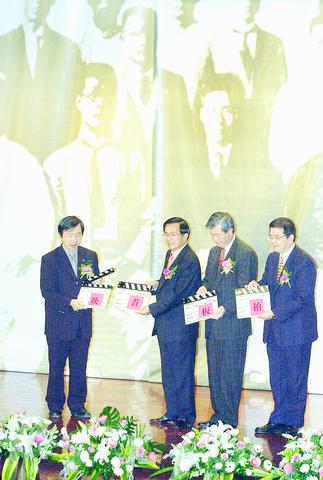Authors, researchers and descendants of the founders of the Taiwan Culture Association (
Founded on Oct. 17, 1921 by a group of intellectuals where the auditorium of the Blessed Imelda's School (
Its aim was to awaken a Tai-wanese consciousness in its fellow citizens through cultural enlightenment.

PHOTO: CHIANG YING-YING, TAIPEI TIMES
As convener of yesterday's forum, Lung Ying-tai (
"Through the personal narrations offered by the descents of the association's founders, we'd like the younger generation to learn more about the history of Taiwan's cultural and democratic movements," Lung said.
"In addition, we'd like politicians to start pondering what path they feel is the most beneficial for Taiwan," she added.
In addition to the forum, a collection of 44 black-and-white pictures chronicling the development of the association is on display at the school auditorium until Oct. 21 and at the 228 Memorial Museum from Oct. 24 through Nov. 6.
Taipei Mayor Ma Ying-jeou (
"Although the association lasted only 10 years, it affected and continues to affect Taiwan not only culturally but also politically, economically and socially," Ma said.
Chiang Sung-hui (
"What he did was heroic because he not only galvanized nationalism in Taiwan but also trumpeted an idea few people dared to touch during the Japanese colonial era -- anti-imperialism," he said.
The younger Chiang was only 18 when his father died of typhoid in 1931, at the age of 40, after devoting himself to social movements for 10 years.
Three years before his death, the elder Chiang formed the country's first political party, the Taiwan People's Party (
Lin Po-cheng (
"As the largest cultural group of its time, the association pioneered efforts to stage peaceful resistance campaigns against the Japanese regime. Contemporary politicians might learn something from this," he said.

CHAOS: Iranians took to the streets playing celebratory music after reports of Khamenei’s death on Saturday, while mourners also gathered in Tehran yesterday Iranian Supreme Leader Ayatollah Ali Khamenei was killed in a major attack on Iran launched by Israel and the US, throwing the future of the Islamic republic into doubt and raising the risk of regional instability. Iranian state television and the state-run IRNA news agency announced the 86-year-old’s death early yesterday. US President Donald Trump said it gave Iranians their “greatest chance” to “take back” their country. The announcements came after a joint US and Israeli aerial bombardment that targeted Iranian military and governmental sites. Trump said the “heavy and pinpoint bombing” would continue through the week or as long

TRUST: The KMT said it respected the US’ timing and considerations, and hoped it would continue to honor its commitments to helping Taiwan bolster its defenses and deterrence US President Donald Trump is delaying a multibillion-dollar arms sale to Taiwan to ensure his visit to Beijing is successful, a New York Times report said. The weapons sales package has stalled in the US Department of State, the report said, citing US officials it did not identify. The White House has told agencies not to push forward ahead of Trump’s meeting with Chinese President Xi Jinping (習近平), it said. The two last month held a phone call to discuss trade and geopolitical flashpoints ahead of the summit. Xi raised the Taiwan issue and urged the US to handle arms sales to

BIG SPENDERS: Foreign investors bought the most Taiwan equities since 2005, signaling confidence that an AI boom would continue to benefit chipmakers Taiwan Semiconductor Manufacturing Co’s (TSMC, 台積電) market capitalization swelled to US$2 trillion for the first time following a 4.25 percent rally in its American depositary receipts (ADR) overnight, putting the world’s biggest contract chipmaker sixth on the list of the world’s biggest companies by market capitalization, just behind Amazon.com Inc. The site CompaniesMarketcap.com ranked TSMC ahead of Saudi Aramco and Meta Platforms Inc. The Taiwanese company’s ADRs on Tuesday surged to US$385.75 on the New York Stock Exchange, as strong demand for artificial intelligence (AI) applications led to chip supply constraints and boost revenue growth to record-breaking levels. Each TSMC ADR represents

State-run CPC Corp, Taiwan (CPC, 台灣中油) yesterday said that it had confirmed on Saturday night with its liquefied natural gas (LNG) and crude oil suppliers that shipments are proceeding as scheduled and that domestic supplies remain unaffected. The CPC yesterday announced the gasoline and diesel prices will rise by NT$0.2 and NT$0.4 per liter, respectively, starting Monday, citing Middle East tensions and blizzards in the eastern United States. CPC also iterated it has been reducing the proportion of crude oil imports from the Middle East and diversifying its supply sources in the past few years in response to geopolitical risks, expanding